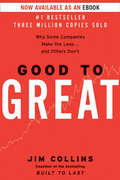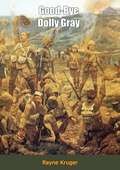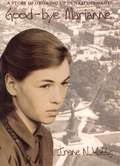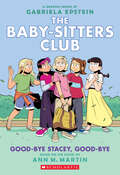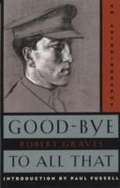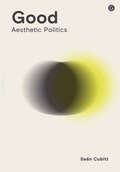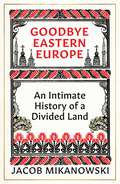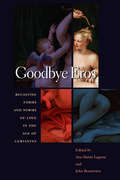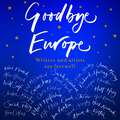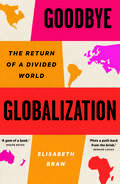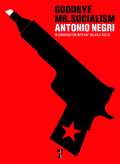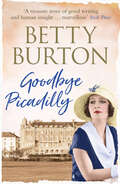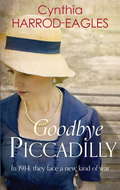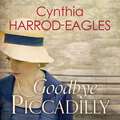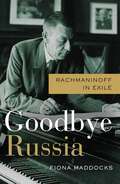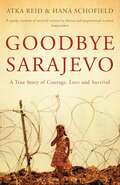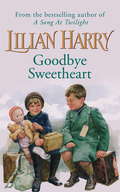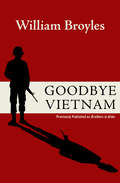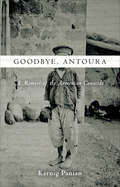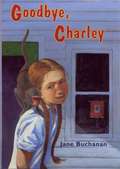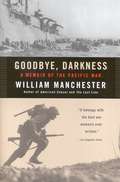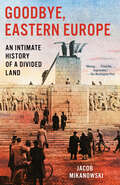- Table View
- List View
Good to Great: Why Some Companies Make the Leap...And Others Don't (Good to Great #1)
by Jim CollinsThe Challenge Built to Last, the defining management study of the nineties, showed how great companies triumph over time and how long-term sustained performance can be engineered into the DNA of an enterprise from the verybeginning. But what about the company that is not born with great DNA? How can good companies, mediocre companies, even bad companies achieve enduring greatness? The Study For years, this question preyed on the mind of Jim Collins. Are there companies that defy gravity and convert long-term mediocrity or worse into long-term superiority? And if so, what are the universal distinguishing characteristics that cause a company to go from good to great? The Standards Using tough benchmarks, Collins and his research team identified a set of elite companies that made the leap to great results and sustained those results for at least fifteen years. How great? After the leap, the good-to-great companies generated cumulative stock returns that beat the general stock market by an average of seven times in fifteen years, better than twice the results delivered by a composite index of the world's greatest companies, including Coca-Cola, Intel, General Electric, and Merck.The Comparisons The research team contrasted the good-to-great companies with a carefully selected set of comparison companies that failed to make the leap from good to great. What was different? Why did one set of companies become truly great performers while the other set remained only good? Over five years, the team analyzed the histories of all twenty-eight companies in the study. After sifting through mountains of data and thousands of pages of interviews, Collins and his crew discovered the key determinants of greatness -- why some companies make the leap and others don't. The Findings The findings of the Good to Great study will surprise many readers and shed light on virtually every area of management strategy and practice. The findings include:Level 5 Leaders: The research team was shocked to discover the type of leadership required to achieve greatness. The Hedgehog Concept (Simplicity within the Three Circles): To go from good to great requires transcending the curse of competence. A Culture of Discipline: When you combine a culture of discipline with an ethic of entrepreneurship, you get the magical alchemy of great results. Technology Accelerators: Good-to-great companies think differently about the role of technology. The Flywheel and the Doom Loop: Those who launch radical change programs and wrenching restructurings will almost certainly fail to make the leap."Some of the key concepts discerned in the study," comments Jim Collins, "fly in the face of our modern business culture and will, quite frankly, upset some people." Perhaps, but who can afford to ignore these findings?
Good-Bye Dolly Gray: The Story Of The Boer War
by Rayne KrugerIt was natural for the South African-born writer Rayne Kruger to choose the Boer War for a work of non-fiction. Settled in England, he returned to Johannesburg to interview survivors and consult written records, and Goodbye Dolly Gray, first published in 1959, went on to become the first modern one-volume distillation of existing knowledge on the South African War, concentrating on the campaigning while being mindful of the political consequences for all concerned.Rayne Kruger brilliantly describes the background, the arms and armies, the campaigns and personalities of the war in which soldiers from across the British Empire marched to a succession of brave defeats at hands of sharpshooting farmers. Goodbye Dolly Gray places the glory and the savagery of the South African war into the perspective of modern Africa.“His organization of his vast material is masterly”—TIMES LITERARY SUPPLEMENT“At a time when South Africa and its racial crisis make daily news, this highly readable, lively history recreates the long, grim years of the Boer War […] Th[is] book tells it all. Paul Kruger, Cecil Rhodes, Joseph Chamberlin, Winston Churchill, the Kaiser, General Kitchener, and many others appear as central or fascinating peripheral figures in the telling. And the great battles of Natal and Ladysmith come alive again with exciting, dust-boiling, brutal verisimilitude. Nor are the political forces behind these years of chaotic fighting neglected. The result is an entertaining, instructive historical work of the first order.”—KIRKUS REVIEW
Good-bye Marianne: A Story of Growing Up in Nazi Germany
by Irene N. WattsA heartbreaking story of loss and love. As autumn turns toward winter in 1938 Berlin, life for Marianne Kohn, a young Jewish girl, begins to crumble. First there was the burning of the neighbourhood shops. Then her father, a mild-mannered bookseller, must leave the family and go into hiding. No longer allowed to go to school or even sit in a café, Marianne's only comfort is her beloved mother. Things are bad, but could they get even worse? Based on true events, this fictional account of hatred and racism speaks volumes about both history and human nature. From the Trade Paperback edition.
Good-bye Stacey, Good-bye: A Graphic Novel (The Baby-Sitters Club Graphix)
by Ann M. MartinA brand-new Baby-sitters Club graphic novel adapted by Gabriela Epstein!Stacey McGill is moving back to New York! That means no more Stoneybrook Middle School, no more Charlotte Johanssen, and worst of all... no more Baby-sitters Club. Stacey's friends are crushed when they hear that Stacey's moving, especially Claudia. Stacey is her best friend.What kind of going-away present is good enough for someone so special? And how will the BSC go on without Stacey?
Good-bye To All That: An Autobiography
by Robert GravesIn this autobiography, first published in 1929, poet Robert Graves traces the monumental and universal loss of innocence that occurred as a result of the First World War. Written after the war and as he was leaving his birthplace, he thought, forever,Good-Bye to All That bids farewell not only to England and his English family and friends, but also to a way of life. Tracing his upbringing from his solidly middle-class Victorian childhood through his entry into the war at age twenty-one as a patriotic captain in the Royal Welsh Fusiliers, this dramatic, poignant, often wry autobiography goes on to depict the horrors and disillusionment of the Great War, from life in the trenches and the loss of dear friends, to the stupidity of government bureaucracy and the absurdity of English class stratification. Paul Fussell has hailed it as ""the best memoir of the First World War"" and has written the introduction to this new edition that marks the eightieth anniversary of the end of the war. An enormous success when it was first issued, it continues to find new readers in the thousands each year and has earned its designation as a true classic.
Good: Aesthetic Politics
by Sean CubittWhat is the good life—for me, for us, for the cosmos?Good is an ecocritical enquiry into ethical and political dimensions of aesthetics. Following Aristotle&’s lead, it starts with ethics as the question concerning what is the good life for me, moving on to politics as the good life for us. Like Aristotle, between ethics and politics it inserts the question of the good life for you and me—the question of love. In the end—which is where we all live today—it goes beyond Aristotle&’s human-centred approach, insisting that the good life cannot be thought or lived without including technologies and ecologies. A truly cosmopolitan politics is a politics of the cosmos. Learning from indigenous cultures, it speaks from and with nature and machines in the form of gods and ancestors. Packed with examples from banking apps to cave art, economic manifestos to cookery, passing through music, painting, poetry, and film, the book evokes critical traditions from across the world to present a lucid and accessible case for decolonial and ecocritical aesthetics.
Goodbye Eastern Europe: An Intimate History of a Divided Land
by Jacob Mikanowski'Do not rush to bid farewell to eastern Europe until reading this book. Meticulously researched and beautifully written, this very personal story of the place that one can&’t find on the map pays tribute to the origins of the experiences, cultures and ideas that continue to shape political and ideological battles of the modern world.' Serhii Plokhy Eastern Europe is more than the sum total of its annexations, invasions and independence declarations. From the Baltics to the Balkans, from Prague to Kiev, the area exuded a tragicomic character like no other. This is a paean for a disappearing world of movable borders, sacred groves and syncretism. And an invitation to not forget.
Goodbye Eros: Recasting Forms and Norms of Love in the Age of Cervantes (Toronto Iberic)
by John Beusterien Ana María LagunaTraditional Petrarchan and Neoplatonic paradigms of love started to show clear signs of inadequacy and exhaustion in the sixteenth century. How did the Spanish Golden Age recast worn out discourses of love and make them compelling again? This volume explores how Spanish letters recognized that old love paradigms, especially the crisis of the subject, presented an extraordinary opportunity for revising traditional literary strictures. As a result, during Spain’s nascent modernity, literature took up the challenge to expand existing forms of desire and subjectivity. A range of scholars show how canonical and non-canonical Golden Age writers like Miguel de Cervantes, Diego Hurtado de Mendoza, Francisco de Quevedo, Luis de Góngora, Lope de Vega, and Francisco de la Torre y Sevil became equal agents of the sweeping ontological reconfiguration of the idea of eros that defined their culture. Such reconfiguration includes: the troubling displacement of "self" and "other" seen in sentimental genres like the pastoral or romance; the overlapping of emotions such as love and jealousy characteristic of the baroque lyric and dramatic production; and the conflation of axioms such as eros and eris prevalent in contemporaneous epic experiments. In uniting the findings of often surprising texts, the collection of essays in Goodbye Eros takes a pioneering look at how Golden Age moral, ideological, scientific, and literary discourses intersected to create fascinating re-elaborations of the trope of love.
Goodbye Europe: The unique must-have collection
by VariousThis is not a book about politics. It is a book about what makes us British, and what makes us European.Spend time with some of your favourite writers and artists in this truly unique collection spanning everything from art, language, food, music and movies, to war, literature, driving, nudity, geography, smoking and nature.Featuring pieces of exceptional quality from some of our most treasured novelists, historians, journalists, poets and artists, including: Jessie Burton, Richard Herring, Alain de Botton, Tom Bradby, Val McDermid, Matt Haig, Afua Hirsch, Lionel Shriver, Sarah Perry, Sanjeev Bhaskar, Ian Rankin, Owen Jones, Mark Kermode, Robert Macfarlane, Chris Riddell, Former Prime Minister Jim Hacker and many more.A must-read for anyone who wants to understand the times we live in, our relationship with the continent, and ourselves.* * * * *INCLUDES PIECES BY:Yasmin Alibhai-Brown, Sanjeev Bhaskar, Tom Bradby, Jessie Burton, Ben Collins (aka The Stig), Colonel Tim Collins, Robert Crampton, Adam Dant, Alain de Botton, Kate Eberlen, Matt Frei, Nicci French, Simon Garfield, Jonathan Lynn writing as Former Prime Minister Jim Hacker, Matt Haig, Richard Herring, Jennifer Higgie, Afua Hirsch, Owen Jones, Oliver Kamm, Alex Kapranos, Mark Kermode, Hari Kunzru, Olivia Laing, Marie Le Conte, Amy Liptrot, Robert Macfarlane, Henry Marsh, Val McDermid, Ian McEwan, Hollie McNish, Kate Mosse, Jenni Murray, Sarah Perry, Ian Rankin, Jacob Rees-Mogg, Cathy Rentzenbrink, Chris Riddell, Andrew Roberts, Will Self, David Shrigley, Lionel Shriver, Sunny Singh, Ece Temelkuran, Rob Temple, Bee Wilson, Sarah Winman
Goodbye Globalization: The Return of a Divided World
by Elisabeth BrawA bold new account of the state of globalization today—and what its collapse might mean for the world economy After the Cold War, globalization accelerated at breakneck speed. Manufacturing, transport, and consumption defied national borders, companies made more money, and consumers had access to an ever-increasing range of goods. But in recent years, a profound shift has begun to take place. Business executives and politicians alike are realising that globalization is no longer working. Supply chains are imperilled, Russia has been expelled from the global economy after its invasion of Ukraine, and China is using these fissures to leverage a strategic advantage. Given these pressures, what will the future of our world economy look like? In this groundbreaking account, Elisabeth Braw explores the collapse of globalization and the profound challenges it will bring to the West. Drawing on interviews with prominent executives and policymakers from around the world, Braw poses the difficult questions all businesses and economies will face—and traces the intricate story of globalization from the exuberant &’90s to the embattled present.
Goodbye Mr. Socialism
by Antonio Negri Raf Valvola ScelsiGoodbye Mr. Socialism offers a gripping encounter with one of today's leading leftists, presenting his most up-to-date analysis of global events and insight into the prospects for the Left in an age of neoliberalism. In his most accessible work yet, philosopher Antonio Negri discusses the state of the global Left since the end of the Cold War and suggests a new politics in a series of rousing conversations with Raf Valvola Scelsi. Scelsi prompts Negri to critique the episodes in the post-Cold War period that have afforded the Left opportunities to rethink its strategies and objectives. Addressing the twilight of social democracy, Negri offers a compelling defense of the prospects for social transformation.
Goodbye Piccadilly
by Betty BurtonIn this coming-of-age novel, &“a treasure trove of good writing and human insight&” three friends grapple with romance and women&’s suffrage during WWI (The Irish Press). From the author of the Lu Wilmott series, a stunning saga of friendship, ambition, and love. Otis Hewetson is seventeen years old, pretty but unconventional and rebellious. She spends the summer of 1911 on a glorious holiday with her parents, and on a quest for independence. But little does she realize how her new friendships with Jack and Esther will change her life forever. Their paths are destined to cross as they grow from adolescence through to marriage, the fight for women&’s rights and the bitter bloodshed of the Great War . . . &“It is encouraging when someone like Betty Burton manages against the odds to become a roaring success.&” —The Guardian
Goodbye Piccadilly: War at Home, 1914 (War At Home Ser. #1)
by Cynthia Harrod-EaglesIn 1914, Britain faces a new kind of war. For Edward and Beatrice Hunter, their children, servants and neighbours, life will never be the same again. For David, the eldest, war means a chance to do something noble; but enlisting will break his mother's heart. His sister Diana, nineteen and beautiful, longs for marriage. She has her heart set on Charles Wroughton, son of Earl Wroughton, but Charles will never be allowed to marry a banker's daughter. Below stairs, Cook and Ada, the head housemaid, grow more terrified of German invasion with every newspaper atrocity story. Ethel, under housemaid, can't help herself when it comes to men and now soldiers add to the temptation; yet there's more to this flighty girl than meets the eye. The once-tranquil village of Northcote reels under an influx of khaki volunteers, wounded soldiers and Belgian refugees. The war is becoming more dangerous and everyone must find a way to adapt to this rapidly changing world. Goodbye Piccadilly is the first book in the War at Home series by Cynthia Harrod-Eagles, author of the much-loved Morland Dynasty novels. Set against the real events of 1914, Goodbye Piccadilly is extraordinary in scope and imagination and is a compelling introduction to the Hunter family.
Goodbye Piccadilly: War at Home, 1914 (War at Home #1)
by Cynthia Harrod-EaglesIn 1914, Britain faces a new kind of war. For Edward and Beatrice Hunter, their children, servants and neighbours, life will never be the same again. Perfect for fans of Downton Abbey and Barbara Taylor-Bradford.For David, the eldest, war means a chance to do something noble; but enlisting will break his mother's heart. His sister Diana, nineteen and beautiful, longs for marriage. She has her heart set on Charles Wroughton, son of Earl Wroughton, but Charles will never be allowed to marry a banker's daughter. Below stairs, Cook and Ada, the head housemaid, grow more terrified of German invasion with every newspaper atrocity story. Ethel, under housemaid, can't help herself when it comes to men and now soldiers add to the temptation; yet there's more to this flighty girl than meets the eye.The once-tranquil village of Northcote reels under an influx of khaki volunteers, wounded soldiers and Belgian refugees. The war is becoming more dangerous and everyone must find a way to adapt to this rapidly changing world.Goodbye Piccadilly is the first book in the War at Home series by Cynthia Harrod-Eagles, author of the much-loved Morland Dynasty novels. Set against the real events of 1914, Goodbye Piccadilly is extraordinary in scope and imagination and is a compelling introduction to the Hunter family.
Goodbye Piccadilly: War at Home, 1914 (War at Home #1)
by Cynthia Harrod-EaglesIn 1914, Britain faces a new kind of war. For Edward and Beatrice Hunter, their children, servants and neighbours, life will never be the same again.For David, the eldest, war means a chance to do something noble; but enlisting will break his mother's heart. His sister Diana, nineteen and beautiful, longs for marriage. She has her heart set on Charles Wroughton, son of Earl Wroughton, but Charles will never be allowed to marry a banker's daughter. Below stairs, Cook and Ada, the head housemaid, grow more terrified of German invasion with every newspaper atrocity story. Ethel, under housemaid, can't help herself when it comes to men and now soldiers add to the temptation; yet there's more to this flighty girl than meets the eye.The once-tranquil village of Northcote reels under an influx of khaki volunteers, wounded soldiers and Belgian refugees. The war is becoming more dangerous and everyone must find a way to adapt to this rapidly changing world.Goodbye Piccadilly is the first book in the War at Home series by Cynthia Harrod-Eagles, author of the much-loved Morland Dynasty novels. Set against the real events of 1914, Goodbye Piccadilly is extraordinary in scope and imagination and is a compelling introduction to the Hunter family.
Goodbye Russia: Rachmaninoff in Exile
by Fiona MaddocksThe moving story of Rachmaninoff's years in exile and the composition of his last great work, set against a cataclysmic backdrop of two world wars and personal tragedy.In 1940, Sergei Rachmaninoff, living in exile in America, broke his creative silence and composed a swan song to his Russian homeland—his iconic &“Symphonic Dances.&” What happened in those final haunted years and how did he come to write his farewell masterpiece? Rachmaninoff left Petrograd (now St. Petersburg) in 1917 during the throes of the Russian Revolution. He was forty-four years old, at the peak of his powers as composer-conductor-performer, moving in elite Tsarist circles, as well as running the family estate, his refuge and solace. He had already written the music which, today, has made him one of the most popular composers of all time: the second and third Piano Concertos and two symphonies. The story of his years in exile in America and Switzerland has only been told in passing. Reeling from the trauma of a life in upheaval, he wrote almost no music and quickly had to reinvent himself as a fêted virtuoso pianist, building up untold wealth and meeting the stars—from Walt Disney and Charlie Chaplin to his Russian contemporaries and polar opposites, Prokofiev and Stravinsky. Yet the melancholy of leaving his homeland never lifted. Using a wide range of sources, including important newly translated texts, Fiona Maddocks&’s immensely readable book conjures impressions of this enigmatic figure, his friends and the world he encountered. It explores his life as an emigré artist and how he clung to an Old Russia which no longer existed. That forging of past and present meets in his Symphonic Dances (1940), his last composition, written on Long Island shortly before his death in Beverly Hills, surrounded by a close-knit circle of exiles. Goodbye Russia is a moving and prismatic look at Rachmaninoff and his iconic final work.
Goodbye Sarajevo: A True Story of Courage, Love and Survival
by Atka Reid Hana SchofieldMay 1992. Hana is twelve years old when her older sister Atka puts her on a UN evacuation bus to flee the besieged city of Sarajevo. Thinking they will be apart for a short time, they make a promise to each other to be brave. But as the Bosnian war escalates and months go by without contact, their promise becomes deeply significant. Hana is forced to cope as a refugee in Croatia, while Atka and their younger siblings battle for survival in a city overwhelmed by crime and destruction. Then, when Atka manages to find work as a translator, events take an unexpected turn, and the remarkable events that follow change her life, and those of her family, forever.
Goodbye Sweetheart
by Lilian HarryFrom the outbreak of the Second World War to the evacuation of Dunkirk, GOODBYE SWEETHEART follows the fortunes of the people who live in a working-class street in Portsmouth.Like any street, April Grove in Portsmouth has its good and bad neighbours, its gossip, scandal and romance. But the outbreak of war in 1939 changes everything - especially for the children. Uprooted from their familiar urban existence they are evacuated (some happily, some not) to the country. Then there are the teenagers, whose first loves are accelerated and intensified by the threat of separation; and men and women, too old to fight, who hold the life of the street together. Based on the author's own childhood memories of growing up near Portsmouth, this is a novel which shows us what England was really like then - a story told with such nostalgia and charm that you leave the world it describes longing for the chance to return.
Goodbye Vietnam
by William BroylesIn this &“essential&” memoir, a former marine returns to Vietnam years later to try to make sense of the war (Anthony Swofford, author of Jarhead). When William Broyles Jr. was drafted, he was a twenty-four-year-old student at Oxford University in England, hoping to avoid military service. During his physical exam, however, he realized that he couldn&’t let social class or education give him special privileges. He joined the marines, and soon commanded an infantry platoon in the foothills near Da Nang. More than a decade later, Broyles found himself flooded with emotion during the dedication of the Vietnam Veterans Memorial in Washington, DC. He decided to return to Vietnam and confront what he&’d been through. Broyles was one of the very first combat veterans to return to the battlefields. No American before or since has gone so deeply into the other side of the war: the enemy side. Broyles interviews dozens of Vietnamese, from the generals who ran the war to the men and women who fought it. He moves from the corridors of power in Hanoi—so low-tech that the plumbing didn&’t work—to the jungles and rice paddies where he&’d fought. He meets survivors of American B-52 strikes and My Lai, and grieves with a woman whose son was killed by his own platoon. Along the way, Broyles also explores the deep bonds he shared with his own comrades, and the mystery of why men love war even as they hate it. Amidst the landscape of death, his formerly faceless enemies come to life. They had once tried to kill each other, but they are all brothers now. Previously published as Brothers in Arms, this edition includes a new preface by the author.
Goodbye, Antoura: A Memoir of the Armenian Genocide
by Karnig Panian translated by Simon Beugekian edited by Aram GoudsouzianWhen World War I began, Karnig Panian was only five years old, living among his fellow Armenians in the Anatolian village of Gurin. Four years later, American aid workers found him at an orphanage in Antoura, Lebanon. He was among nearly 1,000 Armenian and 400 Kurdish children who had been abandoned by the Turkish administrators, left to survive at the orphanage without adult care. This memoir offers the extraordinary story of what he endured in those years-as his people were deported from their Armenian community, as his family died in a refugee camp in the deserts of Syria, as he survived hunger and mistreatment in the orphanage. The Antoura orphanage was another project of the Armenian genocide: its administrators, some benign and some cruel, sought to transform the children into Turks by changing their Armenian names, forcing them to speak Turkish, and erasing their history. Panian's memoir is a full-throated story of loss, resistance, and survival, but told without bitterness or sentimentality. His story shows us how even young children recognize injustice and can organize against it, how they can form a sense of identity that they will fight to maintain. He paints a painfully rich and detailed picture of the lives and agency of Armenian orphans during the darkest days of World War I. Ultimately, Karnig Panian survived the Armenian genocide and the deprivations that followed. Goodbye, Antoura assures us of how humanity, once denied, can be again reclaimed.
Goodbye, Charley
by Jane BuchananForming bonds in a time of warIt's the summer of 1943, and for twelve-year-old Celie Marsh the war seems awfully close to her coastal Massachusetts home. She worries about bombs and submarines, and about her big brother, who can't wait to go off and fight. Her little brother doesn't seem to need her anymore, and her best friend has moved away. When her father brings Charley, a monkey, home from work one day, Celie finds the comforting companion she has been missing. But more upheaval is in store: irritating Joey Bentley moves in with his crabby grandmother next door, her mother takes a job building warships, and worst of all, Charley proves to be too wild for Celie to manage. A near disaster forces Celie to make a heart-wrenching decision that teaches her painful lessons about friendship, family, and the meaning of love.This tender novel about relationships, based on the author's mother's experience, is elegantly crafted and suffused with warmth, as well as with a powerful sense of time and place.
Goodbye, Darkness: A Memoir of the Pacific War
by William R. ManchesterIn this intensely powerful memoir, America's preeminent biographer-historian, who has written so brilliantly about World War II in his acclaimed lives of General Douglas MacArthur (American Caesar) and Winston Churchill (The Last Lion), looks back at his own early life and offers an unrivaled firsthand account of World War II in the Pacific, of what it looked like, sounded like, smelled like, and, most of all, what it felt like to one who underwent all but the ultimate of its experiences.
Goodbye, Eastern Europe: An Intimate History of a Divided Land
by Jacob MikanowskiIn light of Russia's aggressive 2022 invasion of Ukraine, Goodbye, Eastern Europe is a crucial, elucidative read, a sweeping epic chronicling a thousand years of strife, war, and bloodshed, from pre-Christianity to the fall of Communism—illuminating the remarkable cultural significance and richness of a place perpetually lost to the margins of history."Eastern Europe" has gone out of fashion since the fall of the Soviet Union. Ask someone today, and they might tell you that Estonia is in the Baltics or Scandinavia, that Slovakia is in Central Europe, and that Croatia is in the eastern Adriatic or the Balkans. In fact, Eastern Europe is a place that barely exists at all, except in cultural memory. Yet it remains a powerful marker of identity for many, with a fragmented and wide-ranging history defined by texts, myths, and memories of centuries of hardship and suffering.Goodbye, Eastern Europe is a masterful narrative about a place that has survived being forgotten. Beginning with long-lost accounts of early pagan life, Mikanowski offers a kaleidoscopic tour of the various peoples who made Eastern Europe their home over the centuries, including the Roma, Jews, and Muslims; the great kingdoms of the medieval period; the rise and fall of the Ottoman, Habsburg, and Russian empires; the dawn of the modern era; the ravages of fascism and Communism; the birth of the modern nation-state and beyond.A student of literature, history, and the ghosts of his own family&’s past, Mikanowski paints a magisterial portrait of a place united by diversity and eclecticism, and of people with the shared story of being the dominated rather than the dominating. The result is a loving and ebullient celebration of the distinctive and vibrant cultures that stubbornly persisted at the margins of Western Europe and Russia, and a powerful corrective that re-centers not only our understanding of how the modern Western world took shape but also the ways in which Eastern Europe has evolved throughout history to become what it is today.
Goodbye, Mersey View
by Lyn AndrewsIn her nostalgic and heart-warming new saga, Sunday Times bestselling author Lyn Andrews evokes the ups and downs of life in the back streets of 1930s LiverpoolLiverpool, World War II. Monica Eustace and Joan McDonald met as next-door-neighbours living in Mersey View in Liverpool. Their friendship is a close as ever, though they're married now, and sharing Monica's grand house on the other side of the city. But war clouds are gathering, casting a shadow over the happy future they dream of with their young husbands . . . Meanwhile, in London, Joan's half-sister Bella is overwhelmed with the glitz and glamour of the city while she's training as a singer - but will she forget her friends back home? As war descends on Merseyside, can the women make their back street dreams reality, or will the close-knit families be torn apart?PRAISE FOR SUNDAY TIMES BESTSELLING AUTHOR LYN ANDREWS:'An outstanding storyteller' Woman's Weekly'Gutsy . . . A vivid picture of a hard-up, hard-working community . . . Will keep the pages turning' Daily Express'A compelling read' Woman's Own'She has a realism that is almost palpable' Liverpool Echo'The Catherine Cookson of Liverpool' Northern Echo
Goodbye, Mersey View
by Lyn AndrewsIn her nostalgic and heart-warming new saga, Sunday Times bestselling author Lyn Andrews evokes the ups and downs of life in the back streets of 1930s LiverpoolLiverpool, World War II. Monica Eustace and Joan McDonald met as next-door-neighbours living in Mersey View in Liverpool. Their friendship is a close as ever, though they're married now, and sharing Monica's grand house on the other side of the city. But war clouds are gathering, casting a shadow over the happy future they dream of with their young husbands . . . Meanwhile, in London, Joan's half-sister Bella is overwhelmed with the glitz and glamour of the city while she's training as a singer - but will she forget her friends back home? As war descends on Merseyside, can the women make their back street dreams reality, or will the close-knit families be torn apart?PRAISE FOR SUNDAY TIMES BESTSELLING AUTHOR LYN ANDREWS:'An outstanding storyteller' Woman's Weekly'Gutsy . . . A vivid picture of a hard-up, hard-working community . . . Will keep the pages turning' Daily Express'A compelling read' Woman's Own'She has a realism that is almost palpable' Liverpool Echo'The Catherine Cookson of Liverpool' Northern Echo
